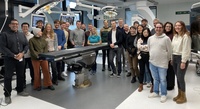 Exploring Innovation in Surgical Technologies Exploring Innovation in Surgical TechnologiesStudents from the Medical Image Processing for Guidance and Navigation course visited Getinge, a global leader in Hybrid Operating Room development. The visit offered valuable insights into advanced surgical technologies and their practical applications in modern healthcare. |
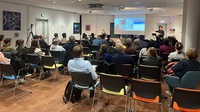 First Nacht der Biosignale First Nacht der BiosignaleOn November 15th, the very first Nacht der Biosignale took place. Simultaneous talks on the fascinating topic of biosignals were held at twelve locations across Germany, including Aachen, Augsburg, Bremen, Dresden, Göttingen, Ilmenau, Jena, Karlsruhe, Kiel, Cologne, Krefeld, and Münster. |
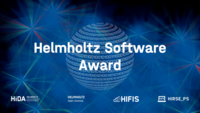 Helmholtz Software Award for openCARP Helmholtz Software Award for openCARPThe openCARP cardiac electrophysiology simulator openCARP developed by IBT and collaborators won the Helmholtz Software Award in the Newcomer category. The award aims to promote the development of professional and high-quality research software and to recognize the commitment to software as the basis of modern science. |
 Honorary Recognition for Axel Loewe Honorary Recognition for Axel LoeweThe head of the Computational Cardiac Modeling research group has been elected as a Fellow of the European Heart Rhythm Association (FEHRA). This recognizes outstanding contributions to research into cardiac arrhythmias. More |
 A new task for Olaf Dössel and an honor A new task for Olaf Dössel and an honorProf. Dr. Olaf Dössel was elected spokesperson for the health technologies thematic network at acatech. acatech is the German Academy of Engineering Sciences. |
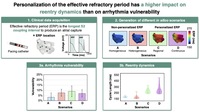 What does it take to build a digital twin of your heart? What does it take to build a digital twin of your heart?Together with researchers from Städtisches Klinikum Karlsruhe and Oxford University, Patricia Martínez and team showed that for atrial arrhythmia prediction, functional measurements make a difference. Incorporating functional personalization into personalize models could improve the ability to stratify patients based on their individual characteristics, leading to more tailored and effective treatment strategies for atrial fibrillation. More |
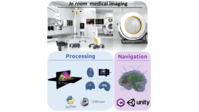 Master Course “Medical Image Processing for guidance and navigation” Master Course “Medical Image Processing for guidance and navigation”A new course for Master Students will be offered since WS 24/25 from IBT lectures. The course, titled “Medical Image Processing for guidance and navigation”, will be worth 9 ECTs for a total of 6 hours per week of lectures/practical exercises plus the accomplishment of a group project. |
 New Research Associate at the IBT New Research Associate at the IBTPascal Maierhofer is working on the validation and improvement of digital twins of the heart for the localization of atrial fibrillation triggers. His focus areas are the application of computer science to medical topics. More |
 DGK Herztage 2024 in Hamburg DGK Herztage 2024 in HamburgFrom September 26 to 28, the DGK Herztage took place in Hamburg – a platform for exchanging the latest insights, innovative solutions, and valuable experiences in the field of cardiology. Christian and Silvia represented the IBT with a poster and two presentations. |
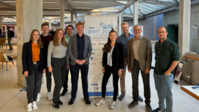 IBT at BMT2024 IBT at BMT2024From September 18 to September 20 the IBT took part at the BMT2024 (“58th Annual Conference of the German Society for Biomedical Engineering) in Stuttgart. Sara Schwab won the second place in the student’s competition. More |
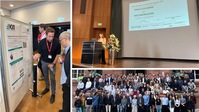 Cardiac Physiome 2024 in Freiburg Cardiac Physiome 2024 in FreiburgThis years Cardiac Physiome Workshop 2024 took place from September 12 to 14, where around 140 researchers engaged on integrating experimental and mathematical approaches to advance cardiac physiology research. In addition to three posters from our group, the contribution of our PhD student Stephanie Appel was selected for a presentation. Our PhD student Jonathan Krauß won the poster award. |
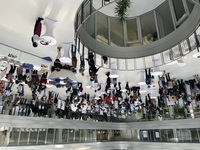 Computing in Cardiology Conference Computing in Cardiology ConferenceKIT hosted the 51st International Computing in Cardiology Conference in Karlsruhe from September 8-11, welcoming over 500 researchers from all over the world. The experts discussed the latest advances in cardiology research and technology in fields including modeling & simulation, ECG signal processing and artificial intelligence in over 220 presentations and 200 posters. more |
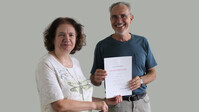 Forty years service anniversary Forty years service anniversaryThe state of Baden-Württemberg would like to thank Irenen Günter for her forty years of service in the public service. The certificate of thanks was presented to her by Professor Werner Nahm in the presence of her colleagues. We wish her all the best for her future endeavors. |
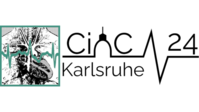 Workshop: Artificial Intelligence for Processing of Biomedical Signals with MATLAB Workshop: Artificial Intelligence for Processing of Biomedical Signals with MATLABOn Sunday September 8, 8:30-11:30am, Mathworks offers a workshop on "Leveraging Artificial Intelligence for Enhanced Processing of Biomedical Signals with MATLAB" on KIT Campus South. Interested participants can find more information and register here. |
 New Research Associate at the IBT New Research Associate at the IBTJulian Mierisch is working on model-informed machine learning for the prediction of postoperative atrial fibrillation and its targeted prevention. His focus areas were Data Science and Software Engineering. More |
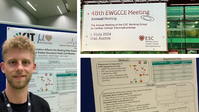 EWGCCE 2024 in Graz EWGCCE 2024 in GrazThe 48th conference of the ESC Working Group on Cardiac Cellular Electrophysiology took place in Graz from July 1 to 3. The focus was on the influence of the autonomic nervous system on heart rate and arrhythmias, compartmentalisation within cardiac myocytes and the latest experimental findings on iPSC cardiac myocytes. Moritz took the opportunity to present his work on the influence of the autonomic nervous system in sinoatrial node cell models. |
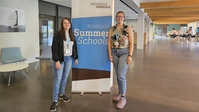 Summer School Bordeaux - Cardiac electrophysiology Summer School Bordeaux - Cardiac electrophysiologyFrom June 17th to June 21st, Stephanie and Silvia attended the Summer School in Bordeaux to deepen their knowledge of cardiac electrophysiology. Engaging lectures and an interactive lab tour at Liryc made this week a remarkable experience. |
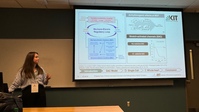 IBT at 8th CMBE IBT at 8th CMBEFrom June 24 to June 26, the 8th International Conference on Computational and Mathematical Biomedical Engineering (CMBE) took place at the George Mason University in Arlington, Virginia. Our PhD student Stephanie was there to present our work on exploring the potential role of stretch-activated channels in the pathogenesis of atrial fibrillation in a mini-symposium on innovative computational models and methods for the cardiac function. More |
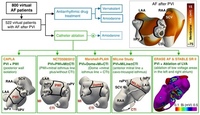 i-STRATIFICATION study examines 800 virtual patients i-STRATIFICATION study examines 800 virtual patientsIn this study by Oxford University and KIT, various therapies were systematically investigated in 800 virtual patients with atrial fibrillation. The study aims to assign patients in whom pulmonary vein isolation was not successful as an initial therapy to optimal pharmacological and ablation therapies on the basis of in-silico tests. Treatment strategies vary depending on atrial size and the presence of low-voltage areas. In-silico models are a promising tool for individual therapy optimization in atrial fibrillation. More |
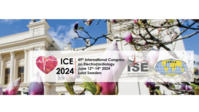 IBT at the International Congress on Electrocardiology IBT at the International Congress on ElectrocardiologyThe 49th edition of the International Congress on Electrocardiology, jointly organized by ISE and ISHNE, was held in Lund, Sweden in June. Axel Loewe presented research at the intersection of mechanistic modeling and machine learning to the mixed clinical/technical audience. As this year marks the centennial of Einthoven's Nobel Prize for the electrocardiogram (ECG), the conference was a perfect occasion to celebrate this invention that remains of utmost relevance for clinical practice and is poised to be propelled to new heights with the advent of artificial intelligence. More |
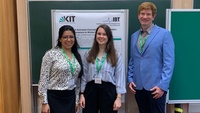 Fickle Heart Workshop 2024 Fickle Heart Workshop 2024From June 2 to June 4, the Fickle Heart Workshop took place at the Isaac Newton Institute of Mathematical Science in Cambridge, focusing on digital twins, artificial intelligence and uncertainty quantification tools for calibration and forecasting. Axel, Patricia and Stephanie took the opportunity of this workshop to present their work in this field. More |
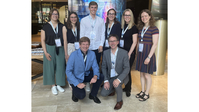 IBT at the Atrial Signals conference in Maastricht IBT at the Atrial Signals conference in MaastrichtFrom June 6th to 8th, IBT attended the Atrial Signals Conference in Maastricht. In addition to 4 poster presentations by our PhD students, Axel Loewe presented his visions for the future of computational models of the heart in atrial fibrillation research. More |
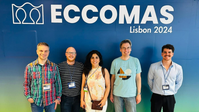 IBT at ECCOMAS conference 2024 IBT at ECCOMAS conference 2024In this year’s European Community on Computational Methods in Applied Sciences (ECCOMAS) conference in Lisbon, our PhD student Joshua Steyer presented his results on electrograms in a cell-to-cell cardiac model within the "Computational Cardiology: Modeling and Simulating the Heart" mini-symposium. More |
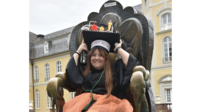 Carmen Martínez Antón, PhD Carmen Martínez Antón, PhDCarmen Martínez Antón successfully defended her PhD thesis „Local Impedance Characterization for Scar and Fibrosis Detection – Towards a New Substrate Assessment for Atrial Mapping” on April 25th 2024. Our heartfelt congratulations! More |
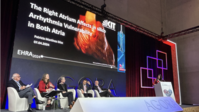 IBT present at DGK and EHRA 2024 Conferences IBT present at DGK and EHRA 2024 ConferencesDuring April the conference of the German society of cardiology (DGK) and the European Heart Rhythm Association (EHRA) took place bringing together cardiologists from Germany and around the world. On the 7th-9th The European Heart Rhythm Association (EHRA) conference took place in Berlin. Our PhD student Patricia Martínez was nominated for the Young Investigator Award in the Basic and Translational Science category and presented her work on the effects of right atrial arrhythmia susceptibility in patient-specific computer models. More |
 IBT at the GAMM annual meeting 2024 IBT at the GAMM annual meeting 2024From March 18 to March 22, 2024 the 94th annual meeting of the GAMM (Association of Applied Mathematics and Mechanics) took place in Magdeburg at the Otto von Guericke university. Our PhD student Jonathan Krauß presented a comparison of different pericardium modeling approaches. More |
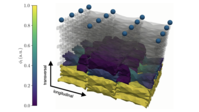 IBT at Biosignals Workshop Göttingen IBT at Biosignals Workshop GöttingenIn this year’s Biosignals Workshop in Göttingen, we presented our work on electrograms in a cell-by-cell model. We have shown that healthy excitation propagation, as opposed to what we would expect in homogenised models, yields asymmetric electrograms exhibiting several small deflections. These deflections, in turn, can be explained by the multimodality of cell activation as well as the deceleration of the excitation wave when transitioning between two cardiac cells. More |
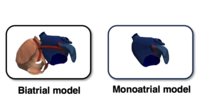 The right atrium affects in silico arrhythmia vulnerability in both atria The right atrium affects in silico arrhythmia vulnerability in both atriaWhat influence does the inclusion of the right atrium have on the assessment of arrhythmia susceptibility in patient-specific computer models? In this study, we investigated differences in arrhythmia susceptibility between monoatrial and biatrial models. Our results suggest that inclusion of the right atrium increases inducibility in the model and also shows a state-dependent influence on arrhythmia dynamics. More |
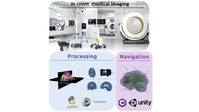 New Master Course “Medical Image Processing for guidance and navigation” New Master Course “Medical Image Processing for guidance and navigation”A new course for Master Students will be offered since SS24 from IBT lectures. The course, titled “Medical Image Processing for guidance and navigation”, will be worth 6 ECTs for a total of 4 hours per week of lectures/practical exercises plus the accomplishment of a group project. |
 Software Carpentry Workshop at KIT Software Carpentry Workshop at KITOn March 19th and 20th 2024, the Institute of Biomedical Engineering is hosting an in person Software Carpentry workshop, primarily open to graduate students and research staff at KIT. More |
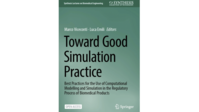 Toward Good Simulation Practice Toward Good Simulation PracticeThis open access book has brought together 138 experts in In Silico Trials working in academia, the medical industry, regulatory bodies, hospitals, and consulting firms. Through a consensus process, these experts produced the first attempt to define some Good Simulation Practices on how to develop, evaluate, and use In Silico Trials. Good Simulation Practice constitutes an indispensable guide for anyone who is planning to engage at any title with In Silico Trials. IBT researcher Axel Loewe has co-edited the chapters Model Development and The Investigator: Modellers and Analysts. More |
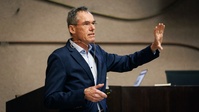 KIT HealthTech at City Hall KIT HealthTech at City HallOn January 29, the KIT Center for Health Technologies presented itself to the Karlsruhe city society in the city hall. KIT Distinguished Senior Fellow Prof. Dössel gave a lecture on "Artificial Intelligence and Machine Learning in Medicine". More |
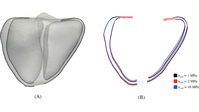 Numerical evaluation of (electro-)mechanic cardiac models Numerical evaluation of (electro-)mechanic cardiac modelsTogether with our collaborators at the Institute for Applied and Numerical Mathematics, we investigated the impact of modeling choices such as mesh size, incompressibility constraint, active strain or active stress as well as the choice of the damping scheme. Click here to learn about our findings: https://onlinelibrary.wiley.com/doi/10.1002/gamm.202370010 More |
 New Research Associate at the IBT New Research Associate at the IBTThe Institute of Biomedical Engineering welcomes Silvia Becker as a new research associate. Since January 2024, she has been working on the analysis of ECG data using machine learning within the “Computational Cardiac Modeling” research group. |
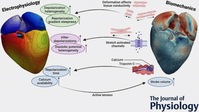 Differential effects of mechano-electric feedback mechanisms on whole-heart activation, repolarization, and tension Differential effects of mechano-electric feedback mechanisms on whole-heart activation, repolarization, and tensionWhich effects does the mechanical activation of the heart cause on the electrical control of cardiac rhythm and excitation? Using the fully coupled electro-mechanical computer model of the heart developed at IBT, we showed that mechano-electric feedback changes activation and repolarization patterns throughout the heart during sinus rhythm and leads to a markedly more heterogeneous electrophysiological substrate. Read the full study published open access in The Journal of Physiology. More |

